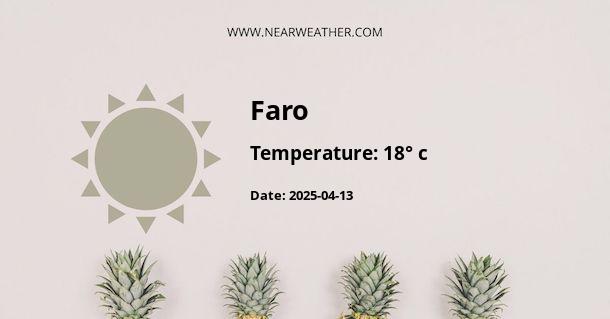Climate and Weather in Faro, Portugal
Faro, located in the southern region of Portugal, is known for its charming old town, beautiful beaches, and vibrant culture. The city enjoys a Mediterranean climate with mild, wet winters and hot, dry summers. Let's take a closer look at the weather patterns and climate in Faro throughout the year.
Temperature
The temperature in Faro varies significantly between the seasons. Summers are hot and dry, with average highs reaching around 28°C (82°F) in July and August. The nights are generally cooler, with temperatures dropping to around 20°C (68°F). Winters, on the other hand, are mild with average highs of 16°C (61°F) in January and February. The nights can get chilly, with temperatures averaging around 8°C (46°F).
It is worth noting that Faro benefits from the moderating influence of the Atlantic Ocean, which helps to keep temperatures relatively mild throughout the year. However, during heatwaves, temperatures can occasionally soar above 35°C (95°F) in the summer months.
Precipitation
Faro experiences a moderate amount of rainfall, with the wettest months being November, December, and January. During this period, you can expect around 100mm (3.9 inches) of rain per month. The summer months, particularly July and August, are relatively dry, with rainfall averaging around 1mm (0.04 inches) per month.
The combination of the relatively low amount of rainfall and the high temperatures during the summer months can result in dry conditions and an increased risk of wildfires. It is essential to follow any local guidelines and restrictions in place during these times.
Sunshine
Faro is blessed with ample sunshine throughout the year. The city enjoys an average of 3,000 hours of sunshine annually, with the sunniest months being July and August, where you can expect around 12 hours of sunshine per day. Even during the winter months, Faro still receives a decent amount of sunshine, with around 6 hours per day.
Wind
The coastal location of Faro means that it experiences coastal breezes and winds. The predominant wind direction is from the northwest, but it can vary throughout the year. Wind speeds are generally moderate, with the strongest winds occurring during the autumn and winter months.
Climate Graph
To visualize the climate patterns in Faro, let's take a look at the following climate graph:

The graph shows the average monthly temperature and precipitation in Faro throughout the year. It is clear from the graph that the city experiences hot and dry summers, mild winters, and a relatively wet period during the late autumn and winter months.
Best Time to Visit
The best time to visit Faro largely depends on your preferences and interests. If you enjoy warm weather and want to spend your days sunbathing on the beautiful beaches, then the summer months from June to September are ideal. However, be prepared for larger crowds and higher prices during this period.
If you prefer milder temperatures and want to avoid the peak tourist season, the spring months of April and May, as well as the autumn months of September and October, offer pleasant weather and fewer crowds.
It is also worth considering specific events and festivals that take place in Faro throughout the year. The city hosts various cultural and music festivals that may enhance your visit, such as the Faro International Motorcycle Rally in July and the Festival F in August.
Conclusion
Faro enjoys a Mediterranean climate with hot, dry summers and mild, wet winters. The city experiences ample sunshine throughout the year, making it an attractive destination for beach lovers and outdoor enthusiasts. Whether you visit during the summer months for the vibrant atmosphere or prefer the milder temperatures of spring and autumn, Faro offers something for everyone.
A - Faro's Latitude is 37.019371 & Longitude is -7.932230.
A - Weather in Faro is 18° today.
A - Climate Conditions in Faro shows scattered clouds today.
A - Humidity in Faro is 82% today.
A - Wind speed in Faro is 12.96 km/h, flowing at 260° wind direction. today.
